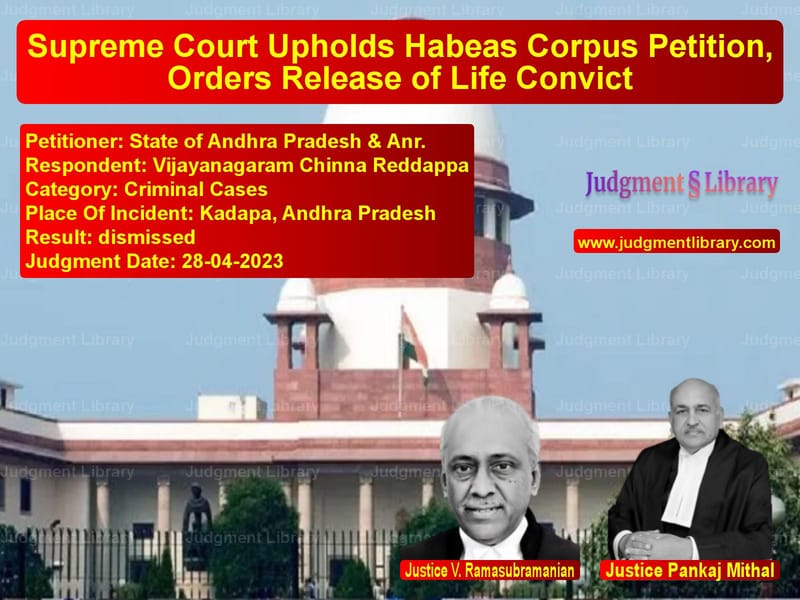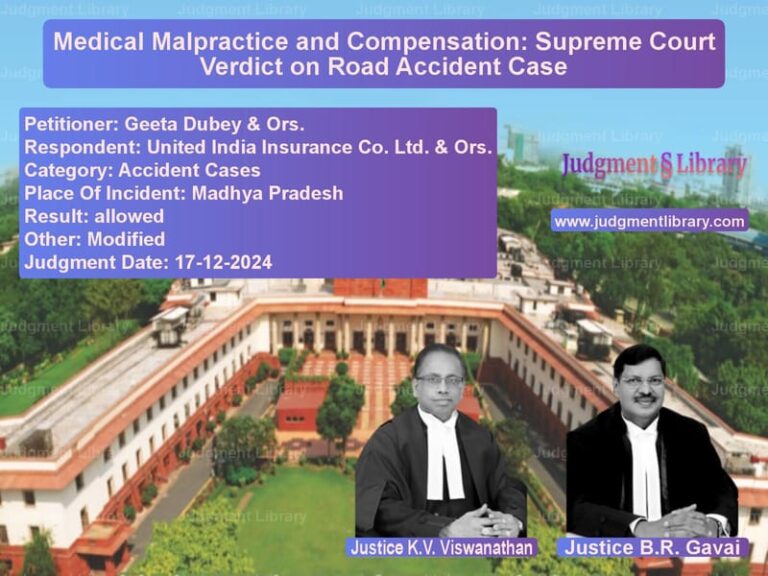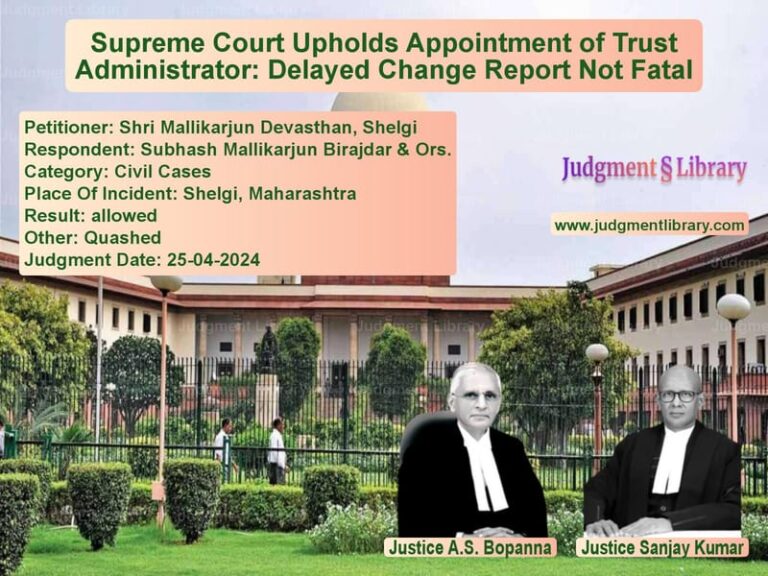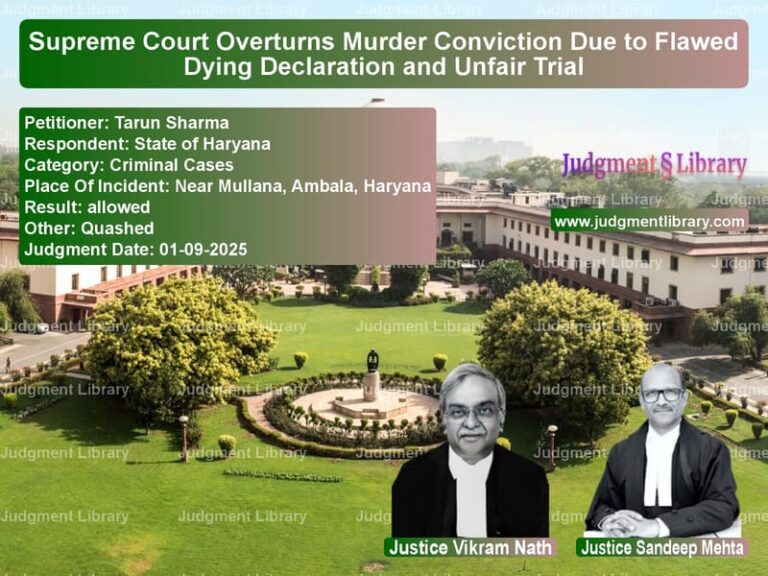Supreme Court Upholds Habeas Corpus Petition, Orders Release of Life Convict
The Supreme Court of India, in the case of The State of Andhra Pradesh & Anr. vs. Vijayanagaram Chinna Reddappa, upheld a habeas corpus petition and directed the immediate release of a life convict. The case revolved around the applicability of Sections 426 and 427 of the Code of Criminal Procedure (CrPC) in determining whether a subsequent sentence should run concurrently or consecutively for a life convict who had been granted remission.
The Court ruled that the convict was entitled to release under a special remission granted by the Andhra Pradesh government, and his continued detention was unlawful. The ruling reinforces the importance of legal clarity in sentencing and remission policies, ensuring that procedural lapses do not result in wrongful incarceration.
Background of the Case
The respondent, P. Reddy Bhaskar, was convicted for murder under Section 302 of the Indian Penal Code (IPC) in Sessions Case No. 139/2006. He was sentenced to life imprisonment by a judgment dated December 19, 2006. The conviction was upheld by the Andhra Pradesh High Court and attained finality.
Additionally, the respondent was convicted in a separate case, Case No. 260/2006, for kidnapping under Section 365 IPC and sentenced to one year of simple imprisonment.
Key developments in the case:
- The convict escaped twice during incarceration but was recaptured both times.
- On August 14, 2022, the Andhra Pradesh government granted special remission to 175 life convicts, including the respondent, on the occasion of Independence Day.
- Despite the remission, the convict was not released, as authorities contended that his sentence in the second case should commence only after remission was granted.
- The convict’s brother-in-law filed a habeas corpus petition before the Andhra Pradesh High Court, challenging the continued detention.
The High Court ruled in favor of the convict and ordered his immediate release. The State of Andhra Pradesh appealed the decision before the Supreme Court.
Key Legal Issues
1. Whether Section 426(2)(b) CrPC applies to a life convict who has been granted remission.
2. Whether the subsequent sentence should run concurrently or consecutively under Section 427(2) CrPC.
3. Whether the convict’s continued detention after remission was legally justified.
Arguments Presented
Petitioner (State of Andhra Pradesh) Arguments
- The remission granted in the murder case did not affect the sentence in the kidnapping case, which should commence only after the first sentence was officially completed.
- Under Section 426(2)(b) CrPC, an escaped convict must serve additional time equivalent to the unexpired portion of his sentence before the subsequent sentence begins.
- The High Court erred in applying Section 427(2) CrPC, which governs concurrent sentencing but does not apply to escaped convicts.
Respondent (Vijayanagaram Chinna Reddappa) Arguments
- Since he was sentenced to life imprisonment, no fixed term was “unexpired,” making Section 426(2)(b) inapplicable.
- Under Section 427(2) CrPC, when a life convict is sentenced to a subsequent term of imprisonment, the subsequent sentence must run concurrently with the previous one.
- The remission granted by the government must be applied in full, and continued detention violated his fundamental rights.
Supreme Court’s Observations
The Supreme Court, led by Justices V. Ramasubramanian and Pankaj Mithal, made the following key observations:
- Section 426(2)(b) CrPC applies to convicts serving definite terms, but life imprisonment is indeterminate and does not have an “unexpired” portion.
- Section 427(2) CrPC governs cases where a life convict is sentenced again; it mandates that the subsequent sentence must run concurrently with the previous life sentence.
- The Andhra Pradesh High Court correctly applied Section 427(2) CrPC, ensuring that the second sentence did not delay the convict’s release after remission.
- The government’s refusal to release the convict despite granting remission was legally unsustainable.
The Court stated:
“A life sentence is a sentence for life. What remains unexpired of such a sentence is known only to God (if you believe) and to the Government, if there is a policy of remission.”
Final Judgment
The Supreme Court ruled as follows:
- The appeal by the State of Andhra Pradesh was dismissed.
- The convict, P. Reddy Bhaskar, was ordered to be released immediately.
- The judgment affirmed that remission must be applied fully and without arbitrary conditions.
Implications of the Judgment
The ruling has significant implications for the criminal justice system and remission policies:
- Clarification on Sentencing Laws: The judgment establishes that Section 427(2) CrPC applies when a life convict receives a subsequent sentence.
- Fair Application of Remission: Government authorities cannot withhold a convict’s release after granting remission.
- Protection of Fundamental Rights: The ruling safeguards the right of prisoners against arbitrary detention.
- Guidance for Future Cases: Courts and state authorities must ensure that remission orders are implemented correctly.
Conclusion
The Supreme Court’s decision in The State of Andhra Pradesh & Anr. vs. Vijayanagaram Chinna Reddappa upholds the principles of justice and fair sentencing. By interpreting the interplay between Sections 426 and 427 CrPC, the Court has clarified an important aspect of remission and concurrent sentencing for life convicts.
This ruling sets a crucial precedent in ensuring that legal technicalities do not become a basis for unjust incarceration. It reinforces the idea that remission granted by the state must be implemented fully, thereby upholding the fundamental rights of prisoners.
Petitioner Name: State of Andhra Pradesh & Anr..Respondent Name: Vijayanagaram Chinna Reddappa.Judgment By: Justice V. Ramasubramanian, Justice Pankaj Mithal.Place Of Incident: Kadapa, Andhra Pradesh.Judgment Date: 28-04-2023.
Don’t miss out on the full details! Download the complete judgment in PDF format below and gain valuable insights instantly!
Download Judgment: state-of-andhra-prad-vs-vijayanagaram-chinna-supreme-court-of-india-judgment-dated-28-04-2023.pdf
Directly Download Judgment: Directly download this Judgment
See all petitions in Bail and Anticipatory Bail
See all petitions in Custodial Deaths and Police Misconduct
See all petitions in Attempt to Murder Cases
See all petitions in Judgment by V. Ramasubramanian
See all petitions in Judgment by Pankaj Mithal
See all petitions in dismissed
See all petitions in supreme court of India judgments April 2023
See all petitions in 2023 judgments
See all posts in Criminal Cases Category
See all allowed petitions in Criminal Cases Category
See all Dismissed petitions in Criminal Cases Category
See all partially allowed petitions in Criminal Cases Category







